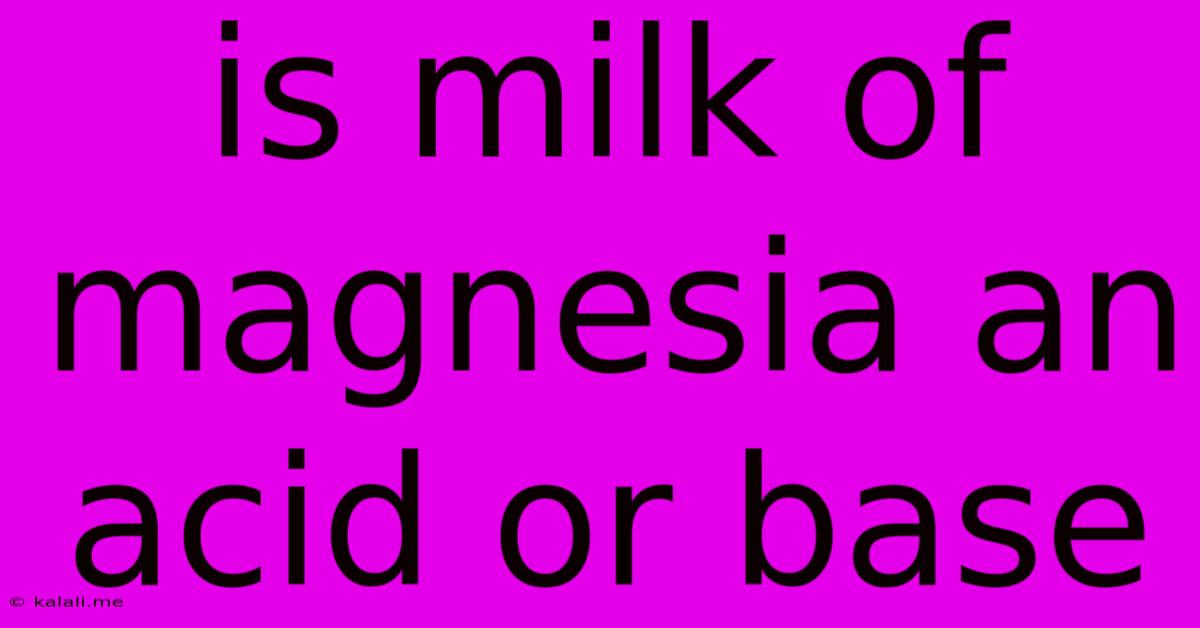Is Milk Of Magnesia An Acid Or Base
Kalali
Jun 15, 2025 · 3 min read

Table of Contents
Is Milk of Magnesia an Acid or a Base? Understanding its pH and Uses
Milk of magnesia, a common household remedy, is often used to relieve constipation and heartburn. But do you know its chemical nature? This article will clarify whether milk of magnesia is an acid or a base, explaining its pH level and how this property contributes to its effectiveness. Understanding its chemical composition can help you better appreciate its medicinal applications and potential side effects.
Milk of magnesia is a base. Its chemical name is magnesium hydroxide, Mg(OH)₂, and it has a pH greater than 7, indicating its alkaline nature. This alkaline property is the key to its effectiveness in treating both constipation and heartburn.
Understanding pH and the Acid-Base Scale
The pH scale measures how acidic or alkaline a substance is. The scale ranges from 0 to 14, with 7 being neutral. Substances with a pH less than 7 are acidic, while those with a pH greater than 7 are alkaline (or basic). The further a substance is from 7, the stronger its acidic or alkaline properties.
Milk of magnesia's high pH means it's a relatively strong base. This alkalinity is crucial to its function in the body.
How Milk of Magnesia's Alkalinity Works
-
Constipation Relief: Milk of Magnesia acts as a laxative by drawing water into the intestines. This softens the stool and stimulates bowel movements. Its alkaline nature helps to neutralize stomach acid, further easing bowel movements. The increased water content in the intestines helps to bulk up the stool, making it easier to pass. This osmotic effect is a key mechanism of action for this common over-the-counter remedy.
-
Heartburn Relief: Heartburn, also known as acid reflux, occurs when stomach acid flows back into the esophagus. Milk of magnesia neutralizes this excess stomach acid, providing relief from the burning sensation. Its strong basicity effectively counteracts the acidity, reducing discomfort.
Potential Side Effects and Considerations
While generally safe when used as directed, excessive consumption of milk of magnesia can lead to side effects such as diarrhea, dehydration, and electrolyte imbalances. It’s crucial to follow the dosage instructions on the label and consult a doctor if you have any concerns or pre-existing health conditions. Frequent or prolonged use should be avoided without medical supervision.
Furthermore, individuals with kidney problems should exercise caution when using milk of magnesia, as it contains magnesium, which can accumulate in the body if kidney function is impaired. This could lead to hypermagnesemia, a condition characterized by high levels of magnesium in the blood, causing symptoms like muscle weakness and nausea. Always consult your physician before using milk of magnesia if you have kidney issues.
Conclusion: Milk of Magnesia - A Useful Base
In summary, milk of magnesia is definitively a base, not an acid. Its alkaline nature is responsible for its effectiveness in treating constipation and heartburn. However, it's essential to use it responsibly and follow dosage instructions carefully to avoid potential side effects. Always consult a healthcare professional before using any medication, including over-the-counter remedies like milk of magnesia, especially if you have pre-existing health conditions. Understanding its chemical properties can empower you to make informed decisions about your health.
Latest Posts
Latest Posts
-
Fill In The Blanks Questions With Answers
Jun 16, 2025
-
What Is A Block In The Periodic Table
Jun 16, 2025
-
How Many Meters Are In A Decameter
Jun 16, 2025
-
Regulates The Exit Of Partially Digested Food From The Stomach
Jun 16, 2025
-
Electrical Current Is Defined As The Flow Of
Jun 16, 2025
Related Post
Thank you for visiting our website which covers about Is Milk Of Magnesia An Acid Or Base . We hope the information provided has been useful to you. Feel free to contact us if you have any questions or need further assistance. See you next time and don't miss to bookmark.